|
Biographical Log of Michael Furstner - Page 151
08 | 09 ||
2010 :
Jan |
Feb |
Mar |
Apr |
May |
Jun |
Jul |
Aug |
Sep |
Oct |
Nov |
Dec || Page :
Previous |
Next
The Martinshof Story -
A Philosophy of Happiness -
Life Awareness -
Maps & other Text series
Most Recent -
Next -
Previous -
Page 1 -
Photos -
Index -
Topics -
MP3s -
Jazclass Links
Thursday, April 1 2010
(diary)
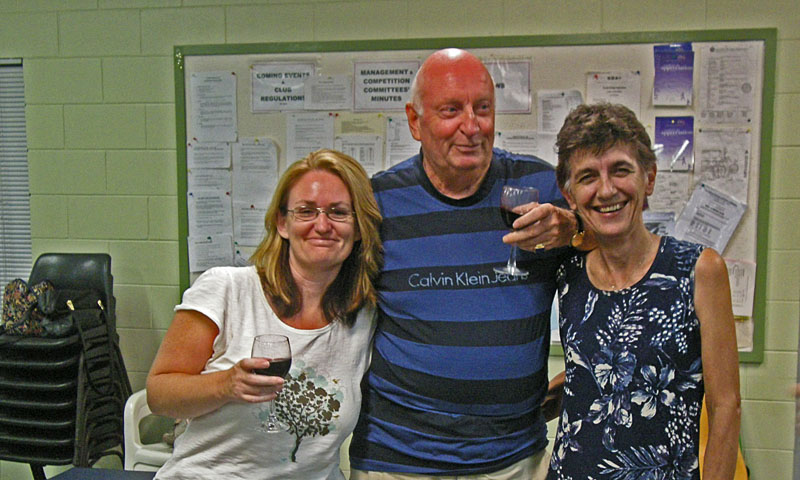 Once again we have arrived at April 1, one of
the Dutch historic days on the calender.
Once again we have arrived at April 1, one of
the Dutch historic days on the calender.
We completed our two serious bridge competitions this week (GNOT teams, and Mixed
pairs) and ended up third in both events. The pairs event last night was in particularly
rewarding in which Mairead and I finished third amongst 15 pairs of experienced
quality players.
But the week is not over yet, more bridge tonight at Palmerston with
Mairead and also tomorrow (Good Friday) with Freda again in Darwin.
I am also very pleased with my present diet regime. I have only been on it for 2
weeks or so but have definitely lost some weight. I feel quite good too. In the morning
some light fruit yoghurt and fruit juice, with lunch just salads with a piece of fish,
in the evening generally only some crackers with cheese, pickles, metwurst. I also
hardly drink any beer, one glass a week, but I drink a fair bit of red wine at our
various bridge evenings. All up it seems to work quite well.
Most Recent -
Next -
Previous -
Top -
Page 1 -
Photos -
Index -
Topics -
MP3s -
Jazclass Links
Friday - Monday, April 2 - 5 2010
(memories from Asturias)
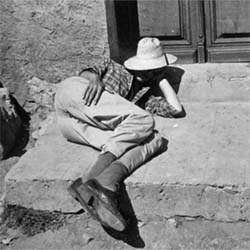 Yes that is me, patiently waiting until Julio too has finished his siesta and
opens the doors to his house and tiny grocery shop, the only store in the small hamlet
of Felechas in Asturias, Northern Spain,
some 150 km (as the crow flies) WSW of Santander.
Yes that is me, patiently waiting until Julio too has finished his siesta and
opens the doors to his house and tiny grocery shop, the only store in the small hamlet
of Felechas in Asturias, Northern Spain,
some 150 km (as the crow flies) WSW of Santander.
Our base camp, a tent and a small shed we may use as office, is in a meadow only a
hundred yards away from his shop, and every afternoon (after having completed our
geological fieldwork) Hauk Fischer and I trod
along the narrow goat track to his door to buy some food, drink a glass of local wine
(so strong we often mix it with water and sugar) and have a chat with Julio. Sometimes
we are in luck and he even invites us in for dinner.
Julio, a nice guy married with
children, has a respectable standing in the village on account of his store and own
motorbike. He has a peculiar nail on one of his index fingers, not flat but shaped like
one from a hawk or eagle. We are great friends.
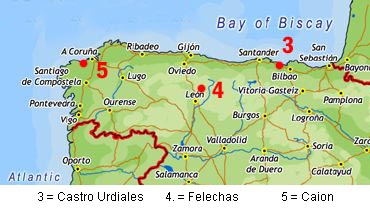 It is the summer of 1958 and we are doing a 6 weeks geological mapping project in Asturias for Professor de Sitter to complete our
Candidaats exam (BSc).
It is the summer of 1958 and we are doing a 6 weeks geological mapping project in Asturias for Professor de Sitter to complete our
Candidaats exam (BSc).
This year I travel to Spain in an interesting way. My father
drops me and two fellow geological students (Freddie Warnaars and Pim Deteger) by car off in Emden in Germany, just across the
border from Holland, where we embark on a small ore freighter on its way to Castro Urdiales (3), just west of Bilbao
on the North coast of Spain.
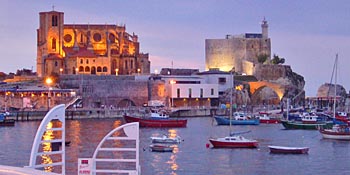 We paid the shipping company 10 Dutch guilders per day (UK £1, US $2.50) which
includes a comfortable bed and all meals on board. We hugely enjoy the 5 day journey
despite some rough weather in the Bay of Biscay and play bridge with a crew
member every night.
We paid the shipping company 10 Dutch guilders per day (UK £1, US $2.50) which
includes a comfortable bed and all meals on board. We hugely enjoy the 5 day journey
despite some rough weather in the Bay of Biscay and play bridge with a crew
member every night.
We disembark at Castro Urdiales on the small boat of the
the customs officials who, like us, take their tax free booty ashore. We loads of
American cigarets, they Dutch Genever rolled in a Dutch Newspaper under their arm.
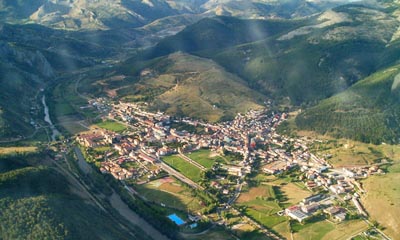 After one night in Bilbao we travel next day by bus and rail via Santander to the small
town of Cistierna. Here we
put up our tent along the river Esla on a grass strip next to the main bridge
into town (the lower one of the two on adjacent photo).
After one night in Bilbao we travel next day by bus and rail via Santander to the small
town of Cistierna. Here we
put up our tent along the river Esla on a grass strip next to the main bridge
into town (the lower one of the two on adjacent photo).
After a good night sleep
we explore the town, but on our return to camp we find that all our tax free cigarets have been
stolen from out tent.
Soon after the police arrive for a friendly chat and enquiry
about our plans in the area, but when they hear of our loss they immediately spring into action.
Unbelievably within 24 hours all cigarets are returned to us. Only one packet has been
broken open with 2 cigarets missing, for which the police apologise. Yes, Spain was
like that in those days!
We spend a few days here in Cistierna. Last year the geology students from Leyden made a
lot of friends here and we are treated with enormous hospitality. Too much of it in
fact. In every bar or restaurant we enter our drinks are paid for us. Fine at first,
but after a while it starts to become embarrassing, as nobody reveals who our generous
donors are. We try sitting outside on the terraces but even there our drinks are paid by
somebody inside.
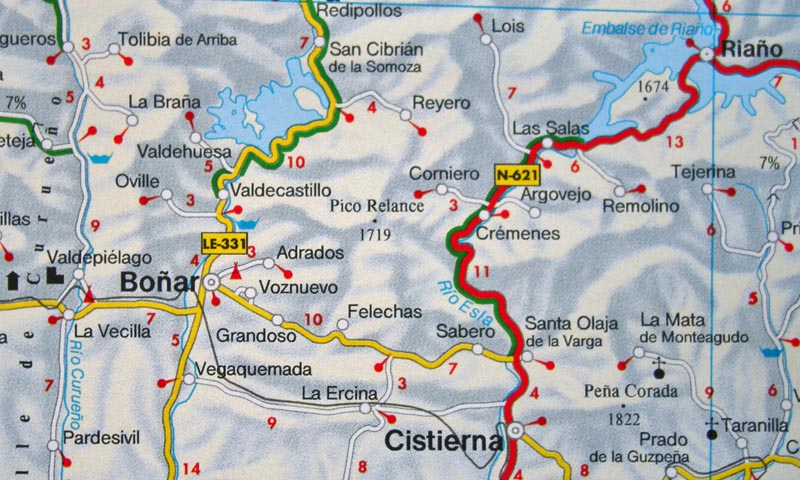 After a few days it is time to move on. I promised Hauk to set up a base camp in our
designated mapping area around Felechas, but Freddy and Pim will work in other areas, so we
part company.
After a few days it is time to move on. I promised Hauk to set up a base camp in our
designated mapping area around Felechas, but Freddy and Pim will work in other areas, so we
part company.
Another geology student with Vespa scooter gives me a lift as far as Sabero, but after that I have to walk
(heavy rucksack with tent on my back) the final 8 km of (what was then a) dirt road to Felechas.
The road follows a valley with on my left (South) several small coal mines near the
bottom of the Southern slopes. Soon a truck loaded with coal overtakes me then stops.
The driver asks me where I am going and offers me a lift.
His name is Ossany (English pronunciation) and over the following weeks he gives
us a lift each time he sees us and we become good friends. Are in fact invited for
lunch with his wife and friends in his home in Boñar one day. He drives
the truck of a coal company, but his dream, he tells me, is to one day own his own and
transport goods all over Spain and France. (A year later when I revisit this area and
have a meal with his family again he has in fact realised that dream. I am so glad for
him.)
Ossany drops me of at an irregular dirt track full of large stones, too narrow
for a car. I see a small village 500 meters or so farther on, slightly uphill :
Felechas. I walk up to and through the village, irregular muddy tracks wherever you look, not a soul
around as it is afternoon, siesta time. The ground rises as I walk on but just beyond
the last house of the village I find some flat grass areas on my left. There is one
meadow with a small wooden shed on it and I pitch my tent here, nice spot overlooking
the village below.

In the evening I find the local pub, a very small room in one of the houses right in
the center of the village. I enter, bar, tables, benches are all of bare unpainted wood
thoroughly scrubbed clean to a light grey colour. Within minutes of me entering the
small room fills up with men, I suspect every man, from the village.
I am offered
wine, poured from a large earthenware jug which is shared all around. "Who are you, what are you doing here, where are you from ?"
With my small Spanish pocket dictionary I explain, and as the wine flows (I am not
allowed to shout a single round myself) my Spanish improves rapidly from zero to almost
3 (out of 10) just on that first evening.
I show them my map. "Mira, mira!" (look, look) "Felechas!!" they cry out. They have never seen the name of their
village in print in their lives before and are mightily pleased. More wine and "Miguel, what have you got there ?" The self winding watch my
Grandmother gave to me for my 18th birthday. I take it of, move it back and forth
alongside my ear so you can hear it rewinding. They all must have a go at that, how
wonderful.
"Have you met the cura yet?". Who the hell is that ?
The Lord Mayor ? No, no, it is the local priest. I have told them I am not a Catholic but a
Protestant (well, sort of), so they insist : "Go and see our cura
tomorrow."
Finally it is time to go home and they all come with me, follow me to my tent. Goodnight
I say and go into my tent, but they remain there, waiting. I put on a light, undress,
climb into my sleeping bag. "Are you alright in there Miguel
?" Yes, yes, I am fine thank you. "OK, muy bien, Buenos
Notches Miguel, hasta mañana." They finally depart, satisfied. I fall
asleep with a wonderful warm feeling inside me, nice people, all of them.
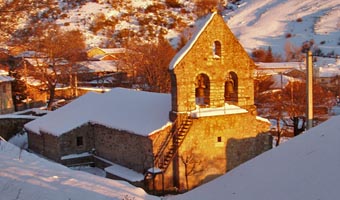 The next afternoon I find the cura's home and knock. I am greeted by two lovely
young ladies, the cura's sisters. We talk, and after a while the cura himself arrives
and I explain our mission.
The next afternoon I find the cura's home and knock. I am greeted by two lovely
young ladies, the cura's sisters. We talk, and after a while the cura himself arrives
and I explain our mission.
Afterwards he walks with me (black cap, white collar,
black robe) through the village and inspects my tent site. We meet nobody in the streets, but
in the evening everyone in the pub knows : "It is OK, Miguel is a
Protestant, but the cura approves of him being here." Now all can relax.
During the following days the cura is in fact most helpful. He gets the
key to the small shed, so that we can use it as our "office" (for hanging maps,
storing samples, etc.) and shelter if the weather turns really bad. One day he even
arrives with a scythe and mows the grass around my tent.
So when Hauk arrives a week later, I am fully
settled in with the locals (Every night in the pub, drinking
wine, speaking Spanish, making friends. One afternoon I try to wash my clothes in the
river like the village women do : they won't have that and insist doing it for me!)
and our camp is in ship shape.
Comments -
Most Recent -
Next Page -
Previous -
Top -
Page 1 -
Photos -
Index -
Topics -
Jazclass Links
Copyright © 2010 Michael Furstner
|







 The next afternoon I find the cura's home and knock. I am greeted by two lovely
young ladies, the cura's sisters. We talk, and after a while the cura himself arrives
and I explain our mission.
The next afternoon I find the cura's home and knock. I am greeted by two lovely
young ladies, the cura's sisters. We talk, and after a while the cura himself arrives
and I explain our mission.